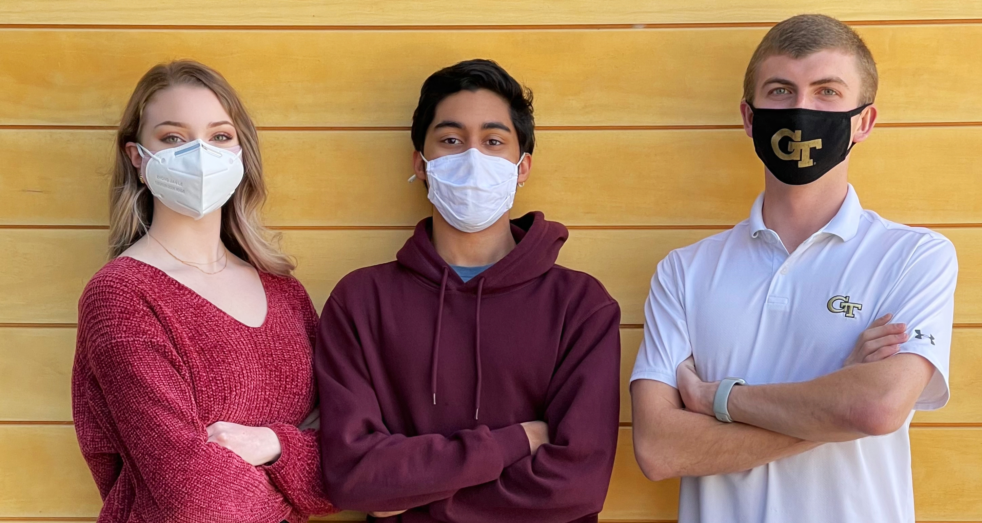In late January, Tech and Emory jointly hosted a virtual hackathon to bring students together to design technological solutions to make returning to work and school settings during COVID-19 easier and safer.
A hackathon is a design race-like event where students come together to tackle different problems by developing software.
Tech’s Coulter Department of Biomedical Engineering and CREATE-X program collaborated with the Emory Global Health Institute and University School of Medicine to host such an event from Jan. 22-24, where students were challenged to come up with solutions for returning to work and school during the COVID-19 pandemic.
“It was originally going to be an in-person event this past fall, and we were going to tackle some of our global health issues on our end,” said Keriann Roy, operations and evaluation manager at the Emory Global Health Institute.
“Then COVID hit, and suddenly we were at home, and someone was like ‘What if we did it on COVID?’ and we switched gears,” Roy said.
She stressed that the event was chiefly a chance for the two Atlanta schools to collaborate and combine some of the main focuses of their curriculums. This also led to a rule of the event where each team had to include both Emory and Tech students. The ongoing circumstances of the pandemic supplied the theme of the event as schools and businesses everywhere struggle to find ways to return to in-person gatherings safely.
Each of the 29 teams in the competition pitched their project to a panel of the judges composed of experts in public health, business, technology and operations.
These included people from Emory, Tech and outside companies who were interested in the solutions offered by the hackathon.
After the initial round of judging, 10 finalist teams were selected, securing a $1,500 prize at least, and were then judged in a final round to determine the winners.
The winning team of the hackathon, Rotations, saw the hackathon as “the perfect opportunity to conceptualize and model ideas backed by research that could help prevent the spread of COVID-19,” said Arvin Poddar, third-year CS, one of the students who worked on the project.
He was joined by Ryan Cobelli, third-year CS, and Merissa Coleman, third-year human health major from Emory, on the project.
“Having an Emory student and two Georgia Tech students enabled us to conceptualize strong tools that maximize public health goals and to create software that allowed us to put our ideas into action,” Poddar said. Both Roy and Poddar mentioned how students could draw from their own personal experiences with social distanced school to inspire the creation of their products.
“As students, we are concerned about our health by the prospect of returning to in-person facilities, which led us to brainstorm our own personal ideas that would help us to feel safe,” said Poddar about why his team decided to participate in the hackathon and where they got the idea for Rotations. Poddar added “the hackathon allowed us to more fully flesh-out our ideas in a careful and thoughtful manner with science and consumer-usage in mind.”
The team created a platform to plan safe room layouts for schools and businesses returning to in-person meetings and utilized cutting edge research on the virus to inform their software.
As the winning team, the students received a $3,500 prize and will be enrolled in CREATE-X’s launch program this summer to turn their project into a startup.
The hackathon produced many other innovative projects. The second place team, COVERED, designed a portable wallet to store and keep masks sanitary.
The third place team, nonose, created a comfortable mask that discourages improper mask wearing. Both of these teams received a $3,500 prize as well.
The products created during the hackathon included software, devices and other projects all designed at aiding the eventual return to in-person events during this pandemic.
“It’s going to take a while before we actually get back to normal,” Roy said. Roy especially thinks Rotations will help people in a less COVID-strict world to still maintain some caution before resuming a completely normal life.
Although the hackathon was restricted to virtual means, the teams in the competition came up with many ideas to help facilitate a safe return to in-person gatherings.
As Roy summed up, the different perspectives brought together by the two schools’ collaboration “gave a different lens” to the competition, allowing for the creation of many multidisciplinary solutions to our present-day issues.
